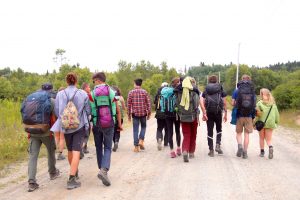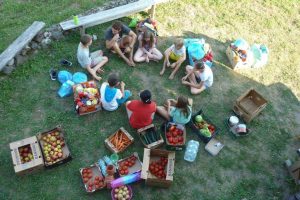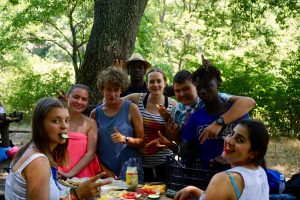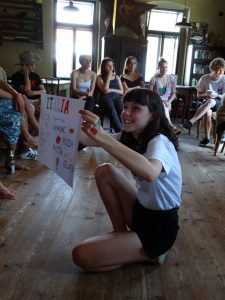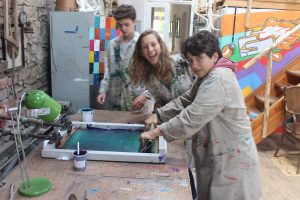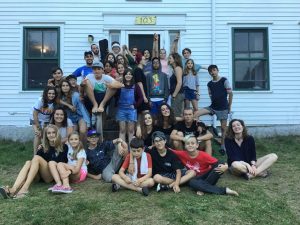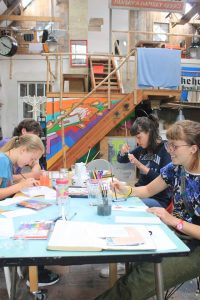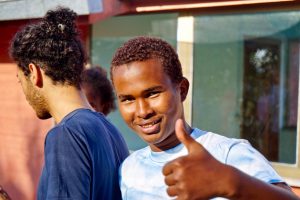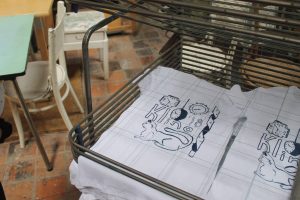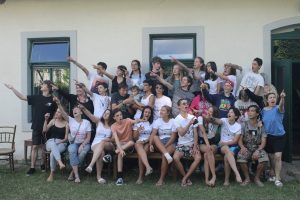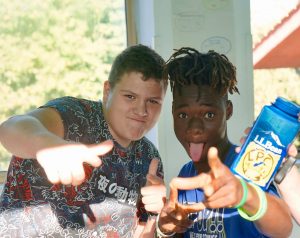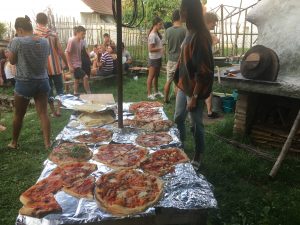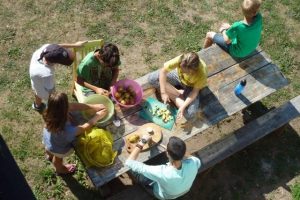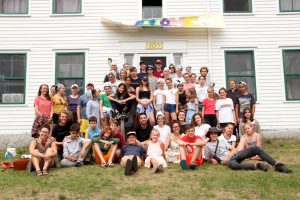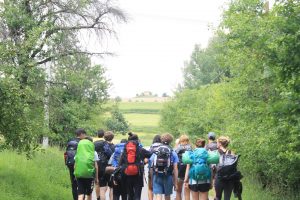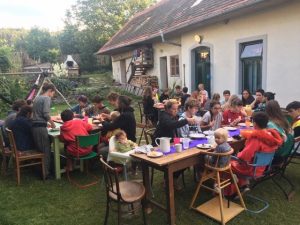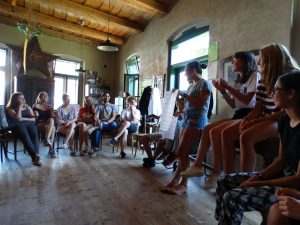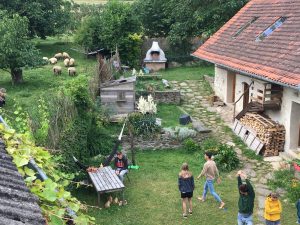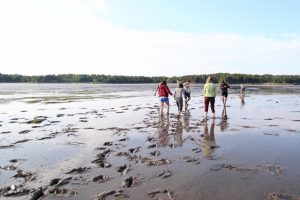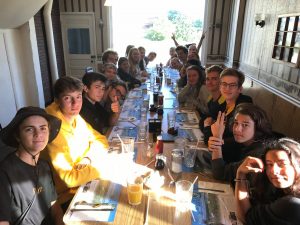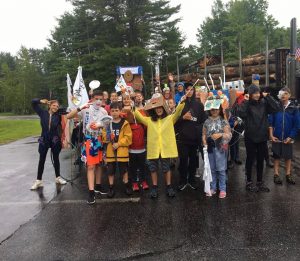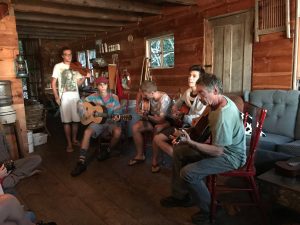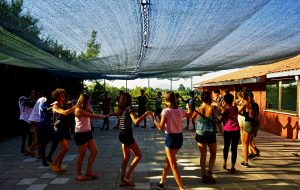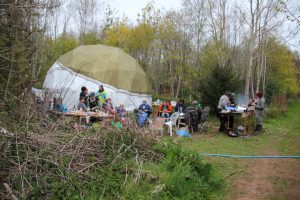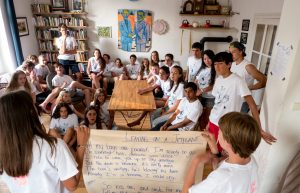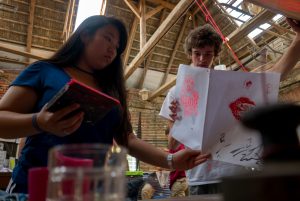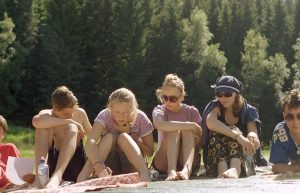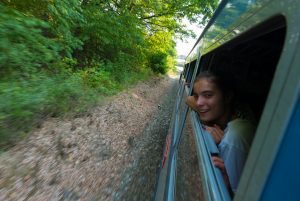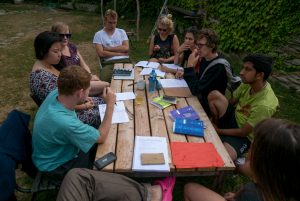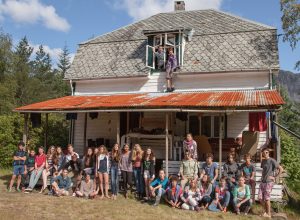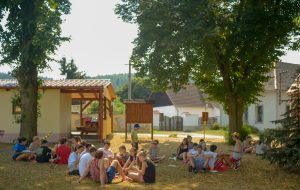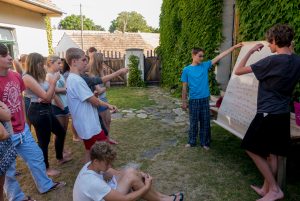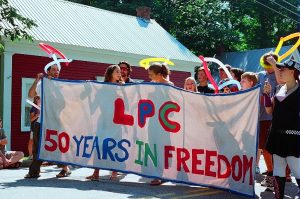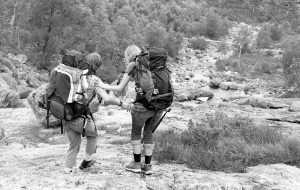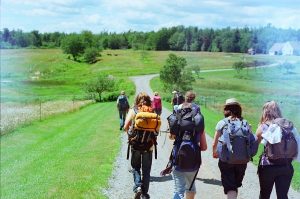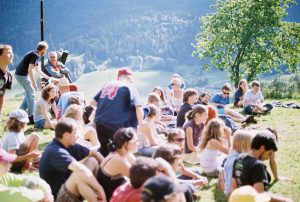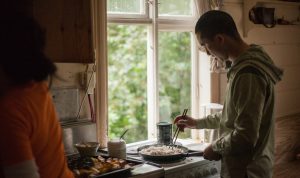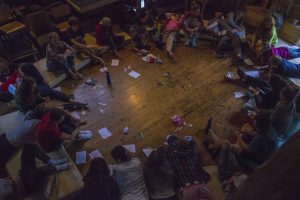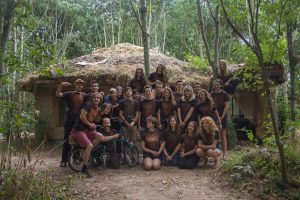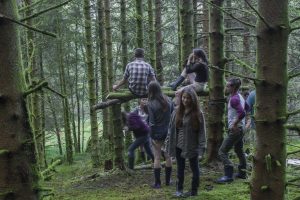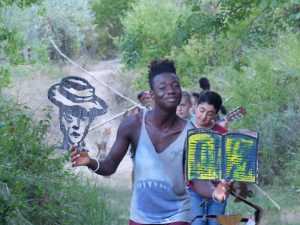Answers to frequently asked questions about LPC, written by Gigi Wizowaty.
For the last seventy-five years, parents have been sending their kids off to LPC and welcoming them home again. By now, many parents have the advantage of knowing LPC from personal experience, having been campers themselves. But for those who are entrusting your kids to us for the first time, we have put together this selection of frequently asked questions to better explain who we are and what we do…
What does LPC do?
LPC runs two programs: one for Younger Kids, 9-14 years of age, and one for Older Kids, 14-17 years of age. Like many summer camps, activities include hiking, swimming, arts and crafts, sports, theater, music, dancing and local excursions. We also place an emphasis on learning languages. In addition, campers aged 14-17 years may focus on service, such as helping adults or children with disabilities, making repairs on houses for the elderly, or maintaining historic buildings. Sometimes an Older Kids’ camp will have a concentration on theater or music, culminating in a performance for the town. The LPC brochure contains further details on what to expect from summer camp, as does our general overview of a typical day at an LPC camp.
LPC differs from other summer camps via our emphasis on each person’s responsibility for the health of the camp community. Campers and counselors work together so that, as time goes on, campers take increasing responsibility for the day-to-day running of the camp. Cleaning the camp house, washing dishes, and meal preparation are a part of everyone’s day. From the beginning, campers are encouraged to participate in the daily planning conference where they have the chance to help with any part of the next day’s events. Campers volunteer to cook and prepare camp meals, plan a game or organize an evening program, with counselors giving advice and as much help as needed. During the course of the summer, campers become increasingly self-reliant, gaining confidence in their abilities.
Some key concepts of LPC camps include the following:
Simple Living
The concept of “simple living” is reinforced throughout LPC. By “simple living,” we mean learning how to make our own fun, figuring out how to use materials that are all around us, and being conscientious about not wasting resources. Campers expecting shiny equipment and high-tech facilities may be disappointed. We believe that living more simply fosters both creativity and ingenuity. For example, a child’s ready-made Superman costume is just a Superman costume, but a ream of plain material can be a magic carpet, a runway for a landing airplane, a king’s robes — or a hand-made Superman costume, which is more fun anyway. For many of today’s children, having fun without the newest equipment is a completely novel experience.
Families
In LPC, campers and counselors are divided into “families” for the summer. Each family eats together, sometimes organizes activities together, and spends time together on excursions and hikes or during the evening program. Made up of different ages, genders, and nationalities, families give campers a chance to get to know children other than the ones they may share a room or language with.
International Understanding
LPC encourages children to share aspects of their culture or nationality with the rest of the camp. This happens naturally through simply living together, but it is encouraged in other ways as well. For instance, during the evening program, a Cambodian camper may tell the story of his life in a refugee camp, or the entire camp may learn how to make a Swedish Midsummer May Pole, or campers might put together a five-course Indian dinner or enjoy an afternoon game of cricket. Counselors help campers think about what they would like to share and support them in their efforts. We also encourage campers to try to learn some of the different languages spoken in camp.
Hikes and Excursions
We try to take advantage of our surroundings as much as possible, and so will take excursions to visit a nearby waterfall, a goat farm where cheese is made, or a ruined castle. Overnight hikes offer campers the chance to climb mountains, paddle down rivers, and explore woods. Hikes are also frequently filled with unexpected and unplanned pleasures. Campers may stumble on a herd of moose gathering early in the morning, they may see showers of falling stars for the first time, or they may discover a lake with a wonderful tree-swing over it. These are the sorts of experiences campers remember forever.
Camp Assemblies
In LPC, camp assemblies have great value and are held regularly. The entire camp sits together to plan for an upcoming event, to solve a camp problem, or to agree on an adjustment to the camp schedule. Translations are also made so that everyone can contribute to the discussion; and, where possible, decisions affecting the whole camp are made by camp consensus.
–
How are campers selected?
At LPC’s annual “Christmas Conference,” camp directors decide how many camps can be held, on the basis of how many qualified directors and counselors are available. Whether camps are for Younger Kids or Older Kids is decided by the number of children applying for each program and the available directors’ interest and expertise. The applicants are then divided into camps with the goal of each camp being balanced by a diversity of nationality, age, gender, culture, language, and experience. Each applicant’s vacation dates also are considered. There are always far more applicants than we have places.
There are several reasons why a child might not be accepted into camp. A child who has been an LPC camper several times already might be turned down in order to give another child a chance. A camp director may feel a particular child just did not enjoy or benefit from his or her camp experience the year before. Or, most often, there just isn’t enough room for everyone. All applicants who do not get offered a place in camp are asked if they would like to be put on a waiting list, and these are considered first if there are any drop-outs. Sometimes, to ensure camps remain well-balanced, we will search beyond the waiting list to fill a spot.
–
Why does the number of camps vary from summer to summer?
The main reason for the annual variation in the number of camps is the availability of trained directors. LPC has an exceptionally thorough training program for its directors, spanning several summers. Once a director is qualified, it is our hope that she or he will be able to direct camps for numerous summers. Unfortunately, it just isn’t possible for most people to take such a great amount of time off every summer — jobs, studies and families sometimes take priority. We are continually training new directors, but inevitably, what results is a rise and fall in the number of camps we are able to hold every year, and consequently how many children can be accepted.
–
Why are some camps longer than others and why do they start and end on different dates?
In an international camp, the school vacation schedules from many different countries have to be considered. Camp houses and directors are also only available for a very specific time period. We try to accommodate the school holiday dates of campers and counselors as best we can, at each particular campsite.
–
How is LPC funded?
LPC is funded through tuition and donations. We work hard to keep our expenses as low as possible so that tuition stays affordable.
–
What is the best way to communicate with LPC?
General questions about LPC and requests for applications are best addressed to LPC’s central office in Switzerland.
Once your child is accepted into camp for the next summer, most of your communication will be with that camp’s director. He or she will send you information about the campsite, tuition, travel, and the camp program, as well as all necessary forms. Most of this communication takes place via email. Please be understanding if your email doesn’t receive an immediate answer — our directors have full-time jobs and studies during the year as well as their camp preparation!
During camp, parents are, of course, free to call or write directors with any questions or concerns they might have. However, we have developed a camp policy that asks parents not to telephone their children during camp. There is a very good reason for this. In our years of experience, we have found that homesickness surfaces most often when parents call. Even the most cheerful phone call can throw a happy camper off balance. Also, the LPC community is a small one — one child on the phone with his or her parents can have the effect of unsettling others. And, with an average of 24 children at a single camp, it can be seriously disruptive when parents call in the middle of activities. We require each camper to write home at least once a week. If you have any concerns about your child’s well-being, please call his or her camp director. Meanwhile, your child will love getting mail from you! (Our campsites seldom have email availability.)
–
What if my child is homesick?
If you think your child is likely to be homesick in camp, please mention it to the camp director. In our experience, the best way for parents to respond to homesickness is to send frequent, cheerful letters from home that avoid saying how much you miss him or her. We are a small community, so the camp staff will be well aware of any child’s homesickness and will make sure that he or she is busy and making connections with other campers. Please do not tell your child that if he or she doesn’t like camp, he or she can come back home after a week! This prevents a homesick child from making a full effort to adjust to camp life. If your child cannot adjust, he or she may not be able to stay; but it is far better for a child to attend camp on the assumption that he or she will succeed. In a serious case of homesickness, the director will telephone you so that you and the staff can work on addressing the issue together.
–
What kind of equipment will my child need?
Every camper will need a sleeping bag, a backpack suitable for overnight hikes, a raincoat, walking shoes, a towel, toiletries, and simple, sturdy clothing. A more detailed list of required equipment will be sent by the camp director before camp. We encourage children to bring musical instruments as well.
–
What kind of food will my child eat during camp?
The LPC diet is one of simple, well-balanced meals, with an emphasis on the food of the camp’s host country. This means that some foods may be new to your child. We encourage campers to try all new foods, and also to help in the preparation of them. Campers are often eager to cook a special dish from home (it’s nice when they bring a favorite recipe) and to practice making the dish at home before camp.
–
Can I pick up my child early for a family vacation?
When a child leaves camp early, it disrupts the entire community and is hard on the child. Unlike larger camps where a camper may only know the children in his or her own cabin, our camp is one big family. For this reason, we do not allow children to leave camp early except for family emergencies, illness, dire homesickness, or unacceptable behavior.
–
My child loves to play on the computer. Can he or she bring the computer to camp?
In this very high-tech world, children often own electronic equipment that they expect to use at camp. For the most part, LPC campers are not allowed iPods, CD or DVD players, computers, electronic games, or mobile phones during camp. The reasons for these restrictions are self-evident: headphones isolate your child from other campers and mobile phones and email prevent them fully engaging in camp life. One of our goals is for all campers to spend time in new ways and to experience things they don’t do at home. In addition, the possession of such electronics highlights the economic disparity between kids and between countries. Particularly for teenagers, doing without these things for a few weeks can be a transformational experience in itself. We ask parents for support in reinforcing these rules. Campers who travel with electronics are asked to turn them in to the camp director for safekeeping for the duration of camp.
–
Will my child have money to spend during camp?
Each camper receives a modest amount of pocket money each week.
–
Can I send packages of sweets to my child?
Please don’t! First of all, there is no need. Your child will be able to buy an ample supply of sweets with the pocket money provided. Secondly, it creates unnecessary hard feelings among the other children. When food packages do arrive, our policy is to share the contents with the whole camp community. However, we do of course make exceptions for special occasions like birthdays.
Besides tuition, what other expenses are there?
Since 2019 money for excursions, local travel, post and weekly pocket money for campers are included in the tuition. Please explain to your child that she or he is expected to turn in any extra (travel) money to the director at the start of camp, which be returned to them for their trip home. The director will request some emergency money (for emergencies only) to be returned at the end of camp if unused.
My child speaks only one language. How will he or she talk to other children?
In every camp, there are children and counselors speaking many different languages. Translations are made all summer long — even when they are no longer needed — so that all campers fully understand what is being said. We believe that it is important for everyone to experience what it’s like to not understand a language and that there is educational value in simply hearing other languages spoken. Often, bilingual campers help with translations. Children, of course, figure out all kinds of ways to communicate with each other — they learn that communication happens through singing, dancing, working and playing together. Language courses are offered in the camp program, and many children do improve their language skills, but LPC is not a language school.
–
My teenager occasionally smokes cigarettes. Will this be tolerated in camp?
No. Smoking is absolutely not allowed, nor are drugs or alcohol.
–
My children both had wonderful summers in LPC last year, but when they came home it was hard for them to adjust to school. Does this happen often?
“Reintegrating” after camp can be difficult for campers, and the more fun your child had at camp, the harder it may be. Because LPC is such a small community, very close friendships are formed and they are not easily left behind. An international experience is a broadening one: when campers return home, they are often surprised to find that their school friends seem to be the same when they themselves feel different. They may find they are noticing racism or sexism around them where they had not before. As it is more common for children to attend camps close to home, LPC campers can feel lonely when there is no one nearby to share their own experiences with. You can help by being aware of these feelings and by encouraging your son or daughter to keep in touch with camp friends. LPC Support Groups in some countries hold reunions during the year that can be fun for your whole family to attend. Hundreds of LPC campers have developed lifelong friendships — having friends to visit in other countries is one of the great benefits of LPC!
Thank you for reading this guide and for choosing LPC. We hope your child’s experience is a strong and positive one. We are always interested in your comments, observations, and questions. You can address them to your son or daughter’s camp director, or you can send them to the LPC central office via email or via post to:
Luethi-Peterson Camps International
Turenmattenstrasse 14
3860 Meiringen
Switzerland
